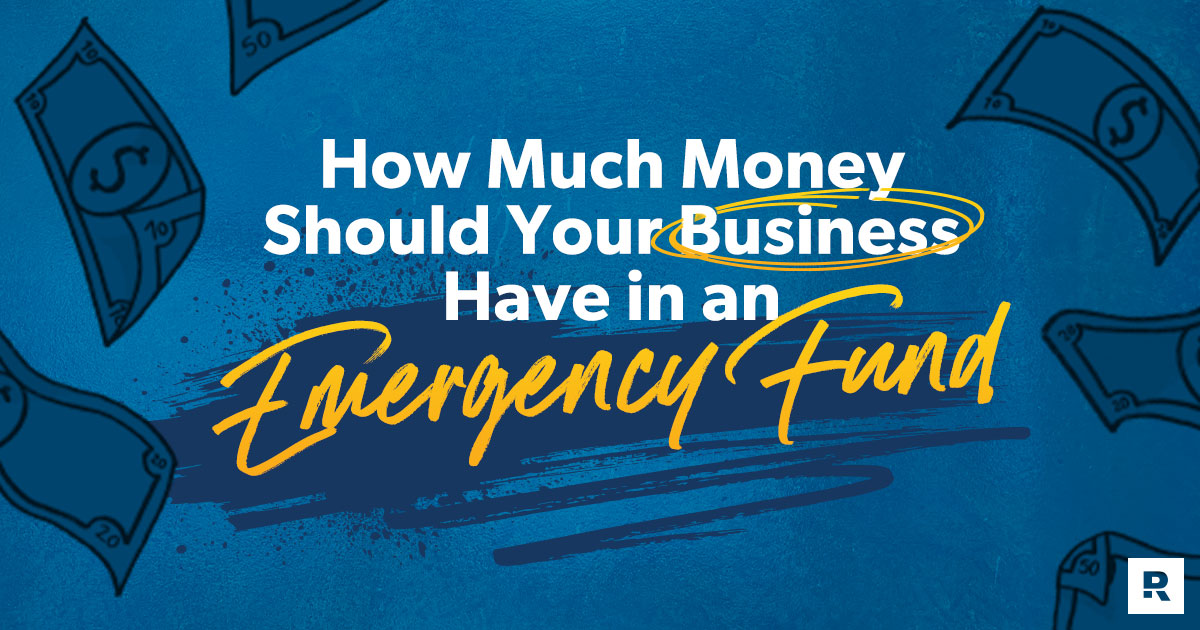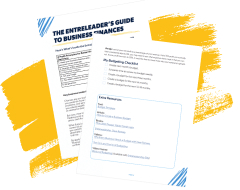How Much Money Should You Have in a Business Emergency Fund?
7 Min Read | Nov 3, 2025

Key Takeaways
- A business emergency fund is money set aside for unexpected financial challenges.
- An emergency fund helps you cover unexpected expenses, handle slow sales, address customer problems, survive disruptions, and avoid debt during financial crises.
- You don’t need to be debt-free before starting to save.
- Aim to save about six months of operating capital in your emergency fund.
- Here are some tips for building your emergency fund: Set up automatic transfers to a separate interest-bearing account, save more during good business months, and remember that even small amounts add up over time.
Don't Let Your Numbers Intimidate You
With the EntreLeader’s Guide to Business Finances, you can grow your profits without debt—even if numbers aren’t your thing.
Ever seen the one-liner “Money talks . . . but all mine says is goodbye”? It’s easy to laugh at a statement like this when it doesn’t hit close to home. But when cash-flow problems and money emergencies become the story of your business, they’re anything but funny.
No matter who you are or what kind of business you run, life will throw some curveballs your way. That’s a guarantee. A bad economy, busted equipment or even a global health crisis can disrupt your financial forecast overnight. But unexpected challenges don't have to destroy your business. With a solid emergency fund, you can weather even the toughest storms and keep moving forward.
Proverbs 21:20 (NIV) says, “The wise store up choice food and olive oil.” In other words, wise people save money. So whether your business is big or small, just getting off the ground or well-established, it’s up to you to wisely build a business emergency fund.
To help you get started, we’ve answered five key questions about creating and managing a business emergency fund—including this big one: How much money should you have set aside?
1. What Is a Business Emergency Fund?
A business emergency fund is a stash of money you keep in a savings or checking account to use for unexpected financial challenges your company faces. It’s a good idea to save this cash in a high-interest account, like a money market account, separate from your operations bank account.
In the accounting world, a business emergency fund is part of your capital reserves, or retained earnings. Business leaders use retained earnings for three things: emergencies, investing in the business, and capitalizing on opportunities.
2. Why Do I Need an Emergency Fund for Business?
If your business operates on a payroll-to-payroll or crisis-to-crisis basis, it’s only a matter of time before an emergency knocks you off course. But when you’ve set aside cash for the unexpected, you can fill financial gaps, manage surprises, and keep your business moving forward.
A business emergency fund helps you prepare for situations like:
- Covering unexpected expenses
- Dealing with slow sales until business picks up
- Handling customer problems, like canceled orders
- Surviving disasters and disruptions
- Avoiding debt by being your own bank
Think about it—what if your biggest customer suddenly cancels a major order, leaving a hole in your revenue? Or, on the other hand, what if a new client places a massive rush order that requires extra inventory, staff, or overtime to fulfill? An emergency fund gives you the flexibility to manage both setbacks and opportunities without throwing your finances off balance.
Now, some business advisors will tell you to take out a line of credit or small-business loan or dig into your personal reserves to keep your business afloat when emergencies strike. But what happens if the creditor comes calling before you’re ready to pay them back? That leaves you vulnerable to more bad money decisions and deeper debt. Having a pile of savings allows you to stay out of debt and keep your head above water until the storm passes.
3. Should My Business Be Debt-Free Before I Start Saving?
You may wonder if you need to pay off all your debt before you start tucking money away, especially if you’re familiar with Ramsey’s 7 Baby Steps. The short answer is no.
The Baby Steps are a plan for your personal finances. First you save $1,000 for a starter emergency fund. Then you pay off all your debt (except your house) with extra cash before finally saving toward a fully funded emergency fund.
But the process to financial freedom for business owners is different. Instead of working on one bucket at a time, EntreLeadership recommends splitting your business profits between these two buckets every month:
- Saving money for retained earnings
- Paying off debt
You get to choose how much goes into each bucket, but here’s what we recommend:
- If your business has debt, adjust your personal salary to a living wage. Pay yourself enough to live comfortably but modestly. (No matter how much you like rice and beans, you’re not going to want to eat them for every meal.)
- Then, split your profits and put a larger amount toward paying down debt and a smaller amount toward savings. For example, you might use 80% of your profits for debt and 20% for retained earnings.
“Operating at the speed of cash is a great way to live.” – EntreLeader Boyd Smith
Is pouring into different buckets at the same time hard? Absolutely. But with focused intensity, it’s 100% doable, and you’ll reap rewards that money can’t buy—like less stress and more time for the people and things you love. EntreLeader Boyd Smith summed up his experience following EntreLeadership’s money strategy for small businesses:
“This plan is not easy, but it’s excellent,” he shared. “Using it, my business became 100% debt-free, including our office building. The retained earnings helped us significantly grow our team, top and bottom line.”
Boyd admits growing at the speed of cash was hard on his ego. “Many of my business buddies have bigger, flashier businesses,” he said. “But they have investors, debt and a lot more stress.”
Plus, those buddies work longer hours and carry a lot more risk without taking home any more money than Boyd does. “Operating at the speed of cash is a great way to live.”
Your Road Map to Grow Your Business
Dave Ramsey’s new book Build a Business You Love is now available for purchase! This book will walk you through the same proven system Dave Ramsey used to build Ramsey Solutions from a card table in his living room to a $300 million company.
4. How Much Should a Business Have in Savings?
Here’s the truth—the amount of cash your business should really have tucked away is more than you might expect. The goal is to save about six months’ worth of operating expenses in cash. That may sound like a lot, but with consistency and a plan, you'll get there one step at a time. These tips will help you grow your business emergency fund, no matter what size your business budget is:
Set up an automatic transfer.
Open an interest-bearing bank account just for retained earnings, and set up an automatic monthly deposit. You’ll be blown away when you see the month-over-month growth of your balance. Just remember that it’s an emergency fund, and resist the temptation to dip into it except for true emergencies. Hint: Those fancy new office chairs are not an emergency—unless your team members are sitting on the floor. Stay strong and save on!
Save even more when business is good.
If you’re a fan of Tom and Donna from Parks and Recreation, you know what it’s like to treat yo’ self. (It’s the best day of the year.) But you don’t have to be a fan to understand the lure of splurging when you have extra money. Our advice: Don’t. When sales are up, pour even more money into your reserves to meet your savings goal. You’ve got this! All the temptations that are calling your name will still be there when you’re truly ready to treat yo’ self.
No amount saved is too small.
Saving big chunks of money isn’t always realistic—especially if your business is small and you’re living on rice and beans to build it. But a penny saved is a penny more in your business emergency fund. And those pennies you sock away for the future will multiply over time. Slow and steady wins the race.
5. When Can I Use the Money in My Business Emergency Fund?
At the risk of sounding like a broken record: Your small-business emergency fund is for business emergencies only. It’s meant to help you weather financial storms.
- Is your desire for the newest truck model or fanciest office furniture a financial storm? No.
- Is broken equipment you need to bring in money a financial storm? Yes.
- What about when you can’t meet payroll because you’re having trouble collecting from your customers? Yes, that’s a storm too.
Now, for a trick question: Is low cash flow during the off months of seasonal business a storm? It shouldn’t be—because you can plan for off-season dips in revenue. Like a squirrel gathers nuts for winter, sock away cash during your peak season to take care of your team in the lean months. And, yes, you’ll keep that extra money in your emergency fund.
Once you have a decent chunk of money saved and a regular savings rhythm, the fun begins! Besides avoiding money mistakes and fielding financial curveballs, you’ll be set to take advantage of sweet opportunities that come your way—without the burden of debt.
Next Step: Take the Guesswork Out of Your Business Finances
You don’t have to fake it until you make it with your business finances. Check out the EntreLeader’s Guide to Business Finances to learn principles and practices that will help you grow your profits without debt—even if numbers aren’t your thing.


